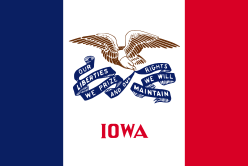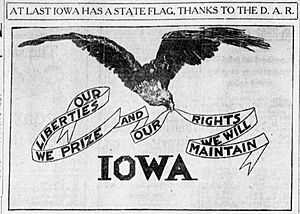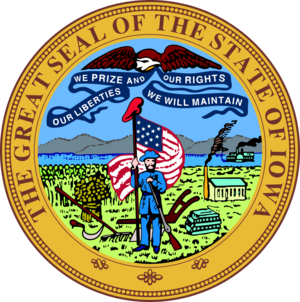Flag of Iowa facts for kids
The flag of the state of Iowa is a special symbol for the state of Iowa. It has three vertical stripes: blue, white, and red. A talented artist named Dixie Cornell Gebhardt designed this flag in 1917. The lawmakers in Iowa officially adopted it in 1921.
Contents
The Flag's Story
For about 75 years, Iowa didn't have its own flag. This was partly because people wanted to show national unity, especially after the American Civil War. Iowa fought for the Union during that war.
Why Iowa Needed a Flag
It wasn't until World War I that people started asking for a state flag. The Iowa Daughters of the American Revolution (DAR) first brought up the idea. Also, Iowa National Guard soldiers serving near the Mexican border asked for a flag. Other states had flags to represent them, and Iowa wanted one too. In 1917, Iowa was one of only three states without its own banner.
Designing the Flag
The flag was designed by Dixie Cornell Gebhardt. She was a member of the DAR and lived in Knoxville, Iowa. Iowa guardsmen asked her to create a design. The DAR flag committee approved her design in May 1917. Then, the Iowa State Council for Defense accepted it on May 11, 1917. The flag was sent to Iowa troops, but it took almost four more years to become the official state flag.
Making it Official
Iowa's governor, William Lloyd Harding, formally accepted the flag on March 19, 1918. However, lawmakers didn't approve it in February 1919. The Iowa Daughters kept meeting with lawmakers. In September 1920, they asked them to accept the flag again. They suggested that the high cost might have been a problem before.
Even though it wasn't official, the flag was often used to represent Iowa across the country. It was even displayed in Memorial Continental Hall with other state flags. This made people want to adopt it officially even more. Finally, in January 1921, Iowa lawmakers discussed the flag again. By mid-March of that year, the flag became law.
How to Use the Flag
The Iowa flag should only be used to officially represent the state. It can also show the difference between citizens from different states. The flag should always fly below the flag of the United States. Public officials are in charge of providing and raising it. Schools must fly the flag when classes are happening. Public buildings can fly the flag on regular weekdays.
What the Flag Looks Like
Iowa law officially describes the state flag.
The design consists of three vertical stripes of blue, white, and red, the blue stripe being nearest the staff and the white stripe being in the center. On the central white stripe is depicted a spreading eagle bearing in its beak blue streamers on which is inscribed the state motto, 'Our liberties we prize and our rights we will maintain' in white letters, with the word 'Iowa' in red letters below the streamers.
—Iowa Code
Colors and Symbols
Dixie Cornell Gebhardt gave meaning to each color on the flag:
- Blue stands for loyalty, justice, and truth.
- White means purity.
- Red symbolizes courage.
The Des Moines Register newspaper said the flag's design reminds us of Iowa's past. Iowa was once a French territory. Both flags have blue, white, and red stripes from left to right. However, Iowa's flag has a wider white section. The Register also said that the word "Iowa" written in red shows how Iowa soldiers bravely defended their ideals.
The Iowa flag is one of nine U.S. state flags that feature an eagle. Other states with an eagle on their flag include Illinois, Michigan, and Missouri. The eagle holding streamers in its beak is also on the Iowa state seal.
See also
 In Spanish: Bandera de Iowa para niños
In Spanish: Bandera de Iowa para niños
- Flag of Des Moines, Iowa
- List of Iowa state symbols
- Seal of Iowa
 | Sharif Bey |
 | Hale Woodruff |
 | Richmond Barthé |
 | Purvis Young |




